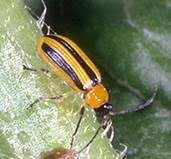
 These beetles can be a problem in gardens in late spring. Protect your young plants by preventing the beetles from reaching the young plants. These beetles can totally kill your cucumbers or other squash plants overnight.
These beetles can be a problem in gardens in late spring. Protect your young plants by preventing the beetles from reaching the young plants. These beetles can totally kill your cucumbers or other squash plants overnight.
Life Cycle and Natural Control of cucumber beetles
Adult beetles overwinter in plant debris and garden trash. Remove garden trash and other debris shortly after harvest to reduce overwintering sites. Females leave their winter sites in early spring and deposit up to 800 orange-yellow eggs in the soil near the base of plants. In about 10 days hatching occurs and the larvae feed for three or more weeks before pupating. First generation adults emerge 10 days later. A complete life cycle requires 6-9 weeks. Beneficial insects, such as ladybugs, green lacewing and the spined soldier bug will feed on pest eggs. Handpick any beetles that are discovered.
Other Control Strategies
Try covering with fine netting or lightweight row cover (a white thin material, can be purchased in many stores with garden areas) Cut a large square and bury edges into the soil around the plant, make it loose enough to allow for growth.
A 2 L pop bottle with the bottom cut off & cap on can also prevent the beetles reaching the young plants. Watch that the plants don’t get too hot in the pop bottle dome. When plant become bigger they will be fine uncovered.
Garlic, Peppers & Onion Insecticide Recipe
2 hot peppers
1 large onion
1 whole bulb of garlic
1/4 cup water
Toss in the food processor and add water, blend until a mash is made. Cover mash with 1 gallon hot (not boiling) water and let stand 24 hours. Strain. Spray on roses, azaleas and vegetables to kill bug infestations. Bury mash in ground where bugs are heaviest. Good for thrips, aphids, grasshoppers, chewing and sucking insects.
Otherwise it is best to plant late in the season past the time when the beetles are active.










Off